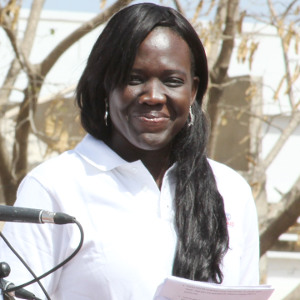General
Source:SuperSport
Professional basketball champion, graduate degree holder, working mother of triplets: Astou Ndiaye is a woman who girls in her native Senegal can look up to – literally. At six-foot-three (190 cm) tall, Ndiaye may have been a natural fit for basketball, but the skills learned playing the game have led to her substantial success off the court as well as on it.

Astou Ndiaye
To share these skills with hundreds of her young compatriots, Ndiaye happily lent her celebrity to the opening of a new project that promotes leadership through sports in Senegal, bringing together the National Basketball Association and developmental organisation USAID.
“This project provides opportunities few of us had when I was growing up,” Ndiaye said of ‘Live, Learn and Play,’ which she supports as an alumna of the WNBA, the women’s counterpart to the world-renowned basketball league. “Not everyone is going to become a professional player, but this project will give girls and boys a chance to stay in school, out of trouble, and healthy … help them become leaders in different fields, whatever they may be.”
She is a firm believer in the value of sports to build character and values in young people: “What you learn on the court you can apply to any aspect of your life. I live it every day. Going through the journey of raising kids, finishing graduate school, being a coach, there are times when you need something to reach back to. To me, that’s sports.”
Ndiaye was born in Kaolack, Senegal but grew up in Dakar. While her government official father was able to meet the family’s needs, with more than 20 brothers and sisters, still “there was not a lot to go around. I always had to fight for my share.” Her mother, who always emphasized the importance of a good education, inspired her to seek creative means to finance her education, which led her to basketball.
From the age of 13, she began to practice tirelessly, through the rainy season and even the Islamic holy month of Ramadan when she was obliged to fast despite the heat. She had the good fortune to have a mentor, Fatou Ndiaye, who was a successful former player herself.
“We were neighbors. The encouragement and the knowledge that she was doing something positive with her life was something that I just kept looking towards,” Ndiaye recalls. Fatou’s guidance was the key to Ndiaye’s progression, which led her to other influential coaches like Abass Bass at club level and later Mbaye Gueye and Businel Diagne with Senegal’s national team.
Live, Learn and Play focuses on training young people between the ages of 13 and 18 in leadership, gender awareness and equality, as well as community participation through basketball.
On a recent visit back to Senegal, Ndiaye told participants in ‘Live, Learn and Play’ that out of a thousand young people working to become professionals, only a handful will actually make the big leagues. For the rest, basketball nonetheless can teach enough toughness and resilience to find a pathway to a bright future where all those skills and a positive attitude can be put to use.
Once she began traveling with the national team and meeting people from different places, she reflected on the emphasis her mother put on education, and realised that success could open academic doors as well as professional ones.
After receiving an athletic scholarship from Southern Nazarene University in Oklahoma, Ndiaye graduated cum laude and eventually made her way to the WNBA, helping lead the Detroit Shock to a league championship in 2003. That same year, she and her former husband welcomed triplets into their family.
Ndiaye had several years of success as a player in the WNBA and around the world with Senegal’s national team before retiring in 2008. She became a coach while pursuing a degree in Human Resources, eventually settling back in Oklahoma to work with the state Health Care Authority.
For Ndiaye, supporting projects such as ‘Live, Learn and Play’ contribute to strengthening women in Africa, an issue close to her heart. While she considers Senegal to be among the more forward-thinking countries in West Africa, women and girls still face significant hurdles because of their gender.
“I want women to be in the forefront,” she says firmly. “Get out there and own it. When women get it, their country goes forward.”
by Richard Zack Taylor, Development Outreach and Communications Advisor - USAID Senegal
